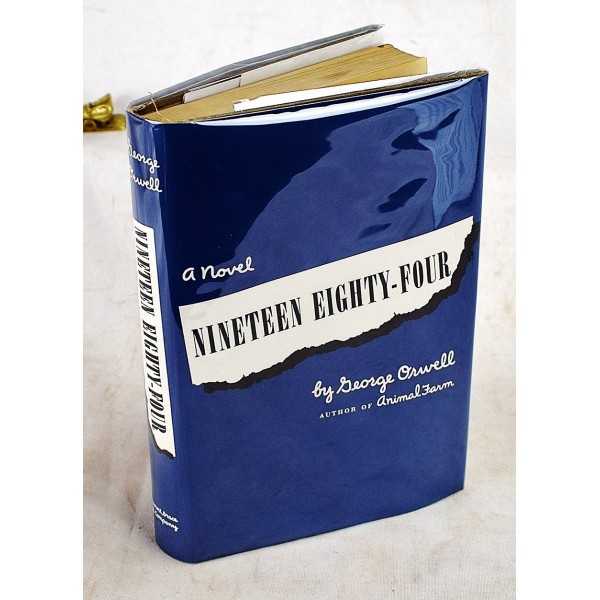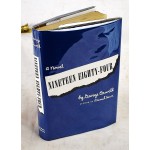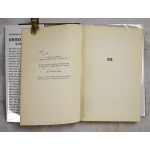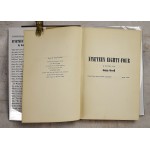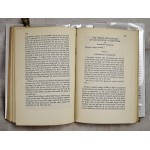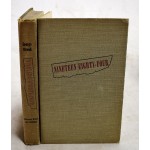Nineteen Eighty-Four
Nineteen Eighty-Four
Orwell, George
Harcourt Brace & Co., 1949
1st American edition and printing, stated on copyright page. (No mention of Haddon on the copyright, no dot on the rear board.) Includes facsimile dust jacket, in mylar. Bound in publisher's tan cloth. Hardcover. Good binding and cover. Head of spine has slight fray. 314 pp. Stamp on front paste down, small note on copyright page. Spine lettering slightly faded. Includes related ephemera about the previous owner, Eugene Sekulow, a bibliophile and student of history and politics, with a focus on Germany. Refs: Fenwick A.12b. Connolly 100
1984 was Orwell's most significant novel. Phrases as 'Double Think', 'Newspeak' and 'Big Brother' were coined in the book. The first US edition was printed by Harcourt, Brace and Company in 1949, only five days after the U.K. edition. The UK edition first printing ran 26,575 copies, the US edition was 20,000..
A wonderful contemporary review by William Soskin, "The disease that has a frenzied world in its grip has been accurately diagnosed. It is the disease of Power-state power and economic power immorally exploited. We know the disease. We do not know the cure. We do not even know the prognosis -whether men will survive or be utterly quelled and defeated. Various writers have attempted to instill in us a dread of the ominous shape of things to come, and they have not succeeded, chiefly because their prognosis has involved time-machines, flights into mechanical and biological fantasies, brave new worlds such as Aldous Huxley's, and erotic ballets of the future such as Robert Graves's recent "Watch the North Wind Rise." They know the symptoms of the disease of Power, these writers, but they somehow have not been able to construct the future in terms close enough to the reality, the fear in our hearts.It is the great realists of literature rather than the satirists and fantasy-spinners, who have had the gift of leading us quietly from what is to what can be. And George Orwell's novel escorts us so quietly, so directly, and so dramatically from our own day to the fate which may be ours in the future, that the experience is a blood-chilling one. Here is a novelist who understands the nature of the beast, the quality of the future to be possessed by Power, and who projects that future not in terms of gadgets or mechanical miracles, not even in terms of such lurid though horribly real machines as the atomic bomb. It is because he creates the totalitarian future in terms of passion and human feeling close to our own that his book has immense stature. Orwell has created a new kind of novel. He has told the story of a comparatively normal fellow, Winston Smith, who is caught in the inexorable machinery of the monolithic state, hounded by the forces of hatred, fear, and cruelty which the new civilization exalts, pursued and beaten into mental and spiritual death. His privacy is dead. In his squalid apartment the telescreen tells him always what to do, how to move and talk and think; what to believe. His every motion may by observed by the Thought Police through this telescreen. Smith works in the Ministry of Truth, falsifying official records and news reports every time the state changes its domestic or foreign policy. Thus history is destroyed and the state controls the past as well as the present and the future. Thus ignorance, an essential condition to the survival of such a state, is exalted. This is an important conception in Orwell’s drama of the disease of Power run rampant, but is it not close enough to our own statistical and communications systems to contain terrifying meaning for our own way of life?In this world which condemns personality, where the dictatorship has conditioned men and women against love, where food is revolting and language has been altered into something called doublethink, whereby you may believe two contradictory things at once (our party-faithful will understand the need for this!), there is still a spark of surviving individuality in Smith. The novel depicts his heroic search for an underground movement in revolt against the nightmare that is the State. It also tells of the sad course of his attempt to escape the frustrated conception of sex and to carry on a love affair that bears some resemblance to romance, some relation to physical joy.He fails, this individualist, and the gestapo which undoes him and the inquisitors who force his confessions and his final submission make our own police methods and our cardinals' trials seem like child's play. The chapters dealing with this final inquisition easily stand comparison with the inquisitor's scene in "The Brothers Karamazov." The story of official pursuit has all the suspense and melodrama of a super-detective novel, but instead of an exercise in criminal chase we are confronted with the grim pursuit that hangs over the head of every modern man. It is a pursuit that makes us examine our own lives with a new eye. It is a novel that heightens today's problems with the light of their wrong solution. It turns a skeptic's gaze on all forms of regimentation, even though momentarily they may seem to be of social benefit.You look again at your radio and television sets with all their bright possibilities for entertainment and education, and you see with horror the spying eyes and ears they may become in every room of the house in the hands of people who have seized a government for the sake of power and power alone. You look again at your daily newspaper which disseminates facts, or at the reports of statistical bureaus which plot and curve the rise and fall of national income, population, and employment, and you suddenly realize that a newspaper or a statistical bureau in ruthless hands are entries to your brain - another possible instrument for the regimen of slavery.The slogans of the super-Party that governs the state in this story are: WAR IS PEACE and FREEDOM IS SLAVERY and IGNORANCE IS STRENGTH. Other products of a public-relations technique not so different from our own are a Hate Party, a Hate Week, and a rigorously enforced TWO MINUTES OF HATE period. Does this seem so remote, after all, in a world that contains populations inculcated with the creeds of Fascism or race superiority? And does it seem so strange that the world of 1984 is divided into three great warring powers - Oceania, Eastasia, and Eurasia- and that these wars are constantly sustained, without victories or defeats, as an economic policy? Have we not learned in our own civilization that there are no victories or defeats, and that wars are all too effective economic instruments of inflation?Nineteen eighty-four is, after all, only thirty-five years off!" WILLIAM SOSKIN, What Can Be, 1984 Review, The Saturday Review, June 11, 1949
